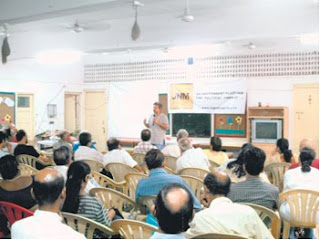How project management can help bring in more focus and effectiveness in any social sector project
(This article of mine has been published in the November 2009 issue of MANAGE India - the online magazine of Project Management Institute, India)
The social sector in
Therefore, it is extremely important for the social sector to operate within strict bounds of professionalism and use best available tools and techniques to manage their projects successfully.
Unfortunately, this does not match with the current reality. An overwhelmingly large majority of social sector projects in
The reasons for this are varied, some of which are genuine. It is true that the vagaries and external dependencies that a social sector project is subject to, are rarely seen in other sectors. This is compounded by the fact that most NGOs have highly heterogeneous teams with non-uniform understanding on project management, and the tools that enable the same. In many cases, especially in rural NGOs, technology skills are a big impediment. On the other hand, many NGOs don’t feel the need to apply modern project management practices because they do not commit themselves to clear annual and quarterly targets.
But is it a wise choice not to adopt standard project management practices due to the inherent complexity of this space? I would argue this otherwise.
It is because of the fact that social sector is fraught with challenges and external dependencies – a chaos or a madness of sorts, it is even more important to deploy relevant practices in project management. To add to this, the resources available are so limited and the windows of opportunity so narrow, that one rarely gets a second chance to make an impact. Clearly then, little or no project management reflects poorly on an organization’s commitment to change.
Over the last few years, Janaagraha has taken important strides towards better project management in its various programs. Defining clear targets and action plans, and reviewing the same periodically are a norm. Weekly review meetings are conducted within programs and at the organizational level to ensure alignment of all staff and volunteers. All of these are open door meetings, where any kind of external input is welcome. This is complemented by a monthly review by the Executive Body and a Quarterly review by the Advisory Board.
Earlier this year, Janaagraha successfully executed
Recently, Janaagraha has initiated an exercise based on Balance Scorecard approach to better define organizational goals and ensure alignment among its various programs. There has also been a shift from excel based project planning towards professional open source tools for project management. I am sure this will yield significant outcomes in the short and long term.


